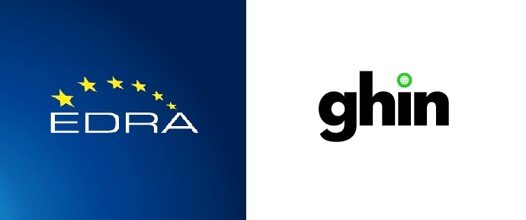It is absolutely essential that the home improvement industry plays a significant role in carbon emission reduction and a future of retail centred on sustainability.
As an industry, we are in a most unique position to tackle sustainability on three fronts: in our own business, together with our suppliers, and also in the lives of our customers.
The EDRA/GHIN Scope 3 Initiative
EDRA/GHIN President, Thierry Garnier, and General Secretary, John W. Herbert, launched the EDRA/GHIN Scope 3 Initiative on stage at the 9th Global DIY-Summit in Berlin.
Later that year EDRA/GHIN announced that we would be partnering with Ricardo, the world renowned strategic, environmental and engineering consultancy, to help the industry on its journey to identify and reduce scope 3 emissions.
What is Scope 3?
Scope 3 refers to one of the three scopes of greenhouse gas (GHG) emissions defined by the Greenhouse Gas Protocol, which is a widely used international accounting tool for government and business leaders to understand, quantify, and manage GHG emissions.
The three distinct Scopes are defined as below:
Scope 1: Direct Emissions
These are GHG emissions from sources that are owned or controlled by the company, such as emissions from company-owned vehicles or on-site fuel combustion.
Scope 2: Indirect Emissions from Purchased Energy
These are GHG emissions from the generation of purchased electricity, steam, heating, and cooling consumed by the company. These emissions occur at the facility where the energy is generated, not at the company using the energy.
Scope 3: Other Indirect Emissions
These are all other indirect emissions not covered in Scope 2 that occur in the value chain of the company, both upstream and downstream.
For retailers the majority of Scope 3 emissions stem from Purchased goods and services and Use of sold products.
Update from the 10th Global DIY-Summit
The ground-breaking Scope 3 emissions reduction Strategy and Roadmap was unveiled at the 10th Global DIY summit in Rome, Italy on 12 June 2024.
Our ambition is clear: we aim to develop a strategy that catalyses value chain decarbonisation in a robust, actionable, and transparent way. We will do this while recognising the data, methodological and implementation challenges that exist today.
This Strategy and Roadmap details the key actions to drive the sector forward on the right path.
EDRA/GHIN President,Thierry Garnier, launched the Scope 3 emissions reduction Strategy and Roadmap, developed with Ricardo, at the 10th Global DIY-Summit.
Thierry highlighted the need to come together, retailers and suppliers, to take actions to decarbonise.
Our aim with this document is to inspire and enable stakeholders from across our sector to take decarbonisation action through three key objectives:
1. Develop clear and consistent emissions calculation methodologies
2. Agree common accounting and reporting standards and reporting platforms
3. Engage with suppliers to drive action and change across the supply chain
EDRA/GHIN Global Scope 3 Decarbonisation Commitment
We recognise the importance of working together and setting out ambitious objectives to decarbonise our sector.
Decarbonisation targets are a powerful way for organisations to kick start action and make progress in reducing their carbon emissions.
The Global Scope 3 Decarbonisation Commitment is made up of two targets.
We are most pleased to announce that seven of our leading members: Kingfisher (UK), OBI (Germany), Hornbach (Germany) Kesko (Finland), Wickes (UK), Maxeda DIY Group (Benelux) and Intergamma (Benelux) have become the first signatories to the seminal Global Scope 3 Decarbonisation Commitment.
Through this Commitment, Kingfisher, OBI, Hornbach, Kesko, Wickes, Maxeda DIY Group and Intergamma have demonstrated their support of the core value that a climate-secure world goes hand-in-hand with successful business operations.
The DIY Platform
Code of Practice 2019
EDRA - GHIN Code of Practice on Responsible and Sustainable Supply Chains
The Code of Practice on Responsible and Sustainable Supply Chains is an initiative of the DIY Platform, in which EDRA/GHIN members collaborate on sustainability challenges within their shared supply chains.
EDRA-GHIN recognised that there instances in which the supply chains of our members could be improved and began working on a Code of Practice that EDRA-GHIN Members could sign to show their commitment to tackling these challenges.
In June 2019, the EDRA-GHIN Board were gathered in Dublin to take part in the 7th Global DIY Summit. It was during this Board Meeting that the Code of Practice on Responsible and Sustainable Supply Chains was signed.
The Code of Practice is an agreement on a common set of principles, upholding fair labour conditions and environmental standards within the global supply chains of the home improvement industry.
The complete Code of Practice can be read at: EDRA-GHIN Code of Practice
EDRA-fediyma Code of Practice on Retailer – Supplier Relationship
On 8th October 2014, the Boards of EDRA and fediyma signed an industry-wide Code of Practice on Retailer / Supplier relations.
The Code sets out a series of principles to be respected by all signatories and a process for remedying any problems between retailers and suppliers. All of the members of EDRA and fediyma are invited to sign this agreement. So far, over 90% of EDRA members have agreed to sign the Code – we aim to achieve 100% by the end of 2016.
Click here to read the EDRA - Fediyma Code of Practice on Retailer - Supplier Relationship

















